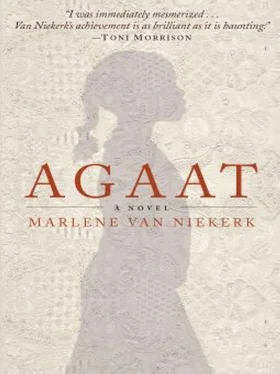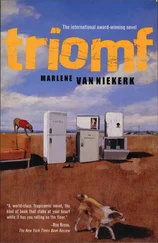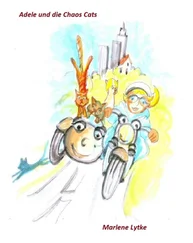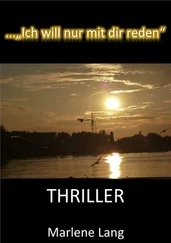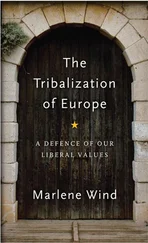After such an episode, after she’d attended to you in your room, she could go missing for hours. Stay with me, Agaat, you asked, but she closed the curtains. Stay with me, I feel scared, you said, but she remained standing there for just a moment, in the twilit room, with her hands folded under her breasts, her white cap, her white apron like nurse’s clothing, before walking out tchi-tchi on her thick-soled school shoes.
Was it one late afternoon that you woke up after such a collapse, after a dream that she had run off, that you went out? You had to look very closely, with the binoculars. She was walking with her head held high. From far away you could make that out. Unimpeachable in her solid body with her even tread she approached, unswervingly, as if she were in a play. This time she wasn’t on the koppie in front of the house where she always, in full silhouette, looked larger than she really was. She was approaching along the footpath in the dryland through the twilit wheatfields, her white cap like a prow above the stalks of wheat.
After half an hour she came in by the back door. All innocence, a castaway lamb under her arm, a story about a hare that had ended up in the jackal trap, a basket of lay-away eggs. That’s the way it always was.
A report of a gate lying wide open, of an empty drinking trough, of a windmill that doesn’t cast, of another kerbstone washed away from the bridge over the drift, of a plume of smoke in the poplar forest. But you knew that there was much more than met the eye to her walks. That evening again, when she’d brought in the food for you, she waited, emphatically and intransigently, for you to tell Jak what she’d found, noticed, suspected. And then she listened, expressionlessly, because the actual information you couldn’t communicate. You didn’t know what it was.
You shut your ears to your own voice pronouncing the deceitful words. You screamed at Agaat.
Stop staring at me as if I’m false! What have I done to you? What do you want me to say?
You slammed your fists on the table. Your glass broke. You put your hand in your mouth, you wanted to pluck out your tongue.
Jak looked at you askance.
My toastmistress, he said, lifted his glass, and carried on eating.
Agaat picked up the shards and took you to your room. She made you take your medicine and covered you with blankets, switched on the night-light by your bed. You listened to her serving Jak’s dessert and coffee, clearing up, closing the windows of the living room for the night.
Those sounds, that silence in which Agaat at length ate her evening meal behind a closed kitchen door, the back door that she pulled shut and locked behind her, the slamming of the screen door, the scuffing of the door of the outside room, all those black sounds to which you were listening in your room lying on your back, they were the opposite of music, they were the sounds of damnation.
Is that what’s become of my paradise here this side of the Tradouw? you thought.
Is that why you wanted to create the garden? Was that your response to the war stories with which Jak entertained Agaat evening after evening? A spell, a safeguard against the distant war and its hurt? Or to gain Agaat for yourself? To win back something of your dream?
You steeled yourself, went in to Jak at night, lay down next to him on his divan in his stoep room, satisfied him while he was half asleep.
What is all this, the stories of keening engines and missiles and explosions and blood and smoke and disembodied limbs and blackened ruins? you asked him after he had come, softly, persuasively, as one would talk to an upset child, so that he would answer you half in a daze, so that you could get the truth out of him.
I know you’re scared, just like me, you said, I know you’re worried. Who do you want to punish with such premonitions? What do you want to achieve by it? After all, you love him, he’s our son, why do you make him out to be one who sows destruction and death? With whom are you angry? Of whom are you afraid?
For a long time you listened by his mouth, to what he would say.
Our minerals, the white man’s future, he mumbled, the terrorists, we must prepare ourselves spiritually against the enemy, there are sacrifices to be made…
Jak, that’s not what I’m asking, you said, that I can hear on the television any day that I have a mind to. Jakkie’s your child, he’s the future. For the sake of what exactly do you want to sacrifice him?
He defends the borders, Jak said, that’s what we whites should have done from the start in this country. He’s obeying orders, and fortunately it’s no longer your and your handmaiden’s orders.
You’re fighting against me, you said, you won the child over to your side and now you’re inciting Agaat against me as well with your blood-thirsty talk.
If the people at home weaken, it’s bad for the morale of the men on the border, Milla, you can support him by showing a bit more fighting spirit instead of taking to your room on any pretext. Why don’t you join the Southern Cross and do something useful for the war?
A paradise, you whispered, your head on his chest, that’s what you promised me, do you remember? Long ago. A flower garden without equal. Let’s make a garden for Jakkie, he won’t always want to fly jet fighters. He’ll come home one day, and then we can show it to him, a sign of. . a sign. .
You couldn’t say it, of what it was supposed to be a sign.
Go ahead, he mumbled, make your garden, you do just what you want to in any case.
You went out onto the stoep. The sweet clove smell of carnations was in the air, the intoxication of the hedge full of white moonflowers. There had always been a garden on Grootmoedersdrift, in summer always a show of hydrangeas and agapanthus, but you wanted more than a higgledy-piggledy farm garden, you wanted to create a bower of beauty, on a few hectares, a park in which you could lose yourself, with arcades of rambling roses and round ponds with fountains, garden rooms such as you’d seen in the magazines, with laid-out paths and boxwood hedges and vantage points, with mixed beds throbbing with larkspur and poppies, striking accent plants, conifers and flaxes, and flowering trees and shrubs in all seasons. Formal of design you wanted the garden to be, but informally planted. Like a story you wanted it, a fragrant visitable book full of details forming part of a pattern so subtle that one would be able to trace it only after a while. That’s how you wanted your garden to be, a composition, a sonata with theme and developments and repetitions in varying keys, something that would form the jewel in the crown of Grootmoedersdrift farm.
Jak grumbled about money when he saw you were in earnest.
You brandished in front of his face the quotation for a de-wrinkling operation that Agaat had found in one of his pockets.
Thousands of rands! It’s your vanity that will ruin us, you said. Why don’t you ever want to help me with anything?
He grabbed your wrists. Keep your nose out of my affairs, to look at you, you’re actually the one who could do with a bit of plastic surgery. Reconstruction for Kamilla!
He pushed his fingers into the corners of your mouth. You tried to resist, to take his fingers out of your mouth.
Just look at you, this misery who calls herself Mrs de Wet. Permanently down in the mouth!
Agaat came upon you. Jak threw your hands from him and wiped his thumb and forefinger, which he’d had in your mouth, on his pants.
What do you want here? he asked.
Agaat’s voice was hard, her businesslike housekeeping voice with which she often broke up your quarrels.
I beg your pardon, Mr de Wet, she said, I just wanted to return the ash pan to the fireplace.
You kept your hands in front of your face, ashamed of her coming upon you like that.
Читать дальше
